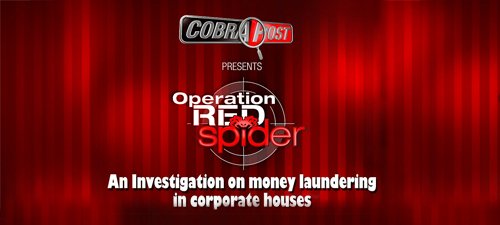Take TCDC card to transfer money abroad or float trust, they suggest, or NGO to make your money clean
Walking to the desk, the Cobrapost journalist tells the woman executive he wants to invest a big amount in some long-term insurance plan with good returns. N. Gupta immediately starts telling about a product of Max Life. The reporter politely asks her if he could discuss it in the privacy of a room. Gupta obliges. The reporter has a reason: A known politician, his relative, wants to invest Rs. 1 crore. It has to be a long-term instrument, with no tax deductions, but with good returns. It has to be done in three names: the politician’s relative, our reporter, his wife and the politician’s wife. In no case should the name of the politician come to light.
Delving into a 20-year investment plan, Gupta tells how this gives an investor tax benefits under Sections 80(C) and 10-10(D). Do you mean what all returns I get from this plan would come to me in white, asks our reporter. Replies Gupta: “Poora white mein hoga ye (It will be all in white).” After she has educated our reporter on the benefits of the plan, the reporter tells her that he has all cash, and then asks her if it was “safest place” to invest black money. A defensive Gupta says she will discuss it with her branch head. Why doesn’t she bring her seniors to his residence nearby to discuss all issues in the evening? Gupta agrees.
As the conversation progresses, Gupta tells the reporter how her senior who has worked with Axis Bank at Solan helps people with black money: “Humare Sir jo hain wo yahan pe three years tak branch head the Solan mein … toh jaise aise unhone bahut saari wahan pe uthai hain yahan pe uthti hain … kyunki logon ko tax saving chahiye … aur upar se jo poora white ho raha hai to wo bhi cheez hai ek …to us wajah se ab … fourth year mein yahan pe aye hain kaafi achha hai baaki ye hai ki aapko jo thodi bahut problem lag rahi hai jaise white black jo aap bata rahe hain wo aapko poora clear karenge (Our Sir was branch head in Solan for 3 years … he has like picked up a lot of such money there … such money is picked up here too …because people want tax saving and then the entire money is becoming white … that is also one thing… that is the reason he has joined here in his fourth year. Now, whatever problem you are telling me with regard to white and black, he will make it all clear to you). He is more experienced.”
So, does she mean her superior has been brought to this new branch to help people make money white?
He has gone out to attend some urgent business but is expected any time soon, Gupta tells the reporter.
We would definitely love to be enlightened by such a seasoned banker like her boss.
She goes out to check if her boss has returned. Some moments later Gupta takes our reporter to G. Singh. Gupta has already briefed him. Our reporter reiterates what he has already told his subordinate. Singh suggests him to invest in tax-free government bonds. Singh also informs him that the Investment Manager is not available as she is Ludhiana based but agrees to get her on phone, if he wished, or arrange a meeting with her. It is fine, says the reporter.
What if we invest a big amount, asks our reporter? Will it come to notice? Singh immediately asks: “Cash mein daalenge ki cheque mein (Will you put it in cash or by cheque)?”
The entire amount is in cash, tells the reporter. Singh goes on to say: “Cash ka hai to fir reporting mein ata hai 10 lakhs ke upar. Ikattha insurance mein bhi nahin daal sakte ek crore rupaye … poora cash mein (If it’s in cash, then it will come in the reporting if it is above Rs. 10 lakh. Altogether, we cannot put Rs. 1 crore even in insurance).”
The reporter again tells him that the investment is to be made in three names. Singh continues: “Toh aapko teeno mein paisa jama karna parega thoda thoda karke (So you have to deposit money in all three accounts but in smaller chunks gradually).” No problem, open three accounts, tells the reporter, since it has to be done in three names.
Singh then says that he will have to call the Investment Manager from Ludhiana and will get back to him in a week.
But we don’t have this much of time. The cash is lying at home and needs to be invested immediately. The reporter tells him. You can come to meet the minister at our residence.
After thinking for some time, when the reporter prods him, Singh suggests: “Aisa hai unke account kholne parenge…aur family members ke accounts kholne hain to khol sakte hain… usmein aap 10 lakhs ke neeche neeche jama karwaiye… jaise hi amount poora ho jaata hai account mein… then you go for the investment… insurance mein ya mutual fund mein ya jismein bhi lagana hai…options bhi hum aapko bata denge… toh apko jo theek lage aap usmein investment kar sakte hain (The thing is we will have to open accounts for them. If there are more family members, we can open accounts for them as well. You can deposit cash less than Rs. 10 lakh in them. As soon as the required amount is accumulated in the account, we go for the investment in insurance or mutual fund or any other instrument which you may like. We will also give you the options. So whatever you think is better, you can make investment in it).”
Fine, now we know we can invest our money by opening multiple accounts and depositing cash less than 10 lakh in them, and avoid trouble.
Singh wants to know the name of politician but his intelligent guest parries the question saying it will be amateurish to tell his name given the sensitivity of the case. So, Singh agrees to send a representative to the politician’s house in the evening to complete the formalities of account opening. He then rings someone on the landline and a few moments later R. Seth joins in. Seth looks after trusts and NGO accounts in whole of Jammu and Kashmir, Himachal and Haryana. Singh briefs him about the proposed investment. Seth asks without preliminaries: “Toh Sir ye pooch raha hun aap cash doge ya cheque doge (Then, Sir I shall ask you if you will give it in cash or by cheque).”
It is all in cash, says our reporter. Shall we have to give PAN, asks the reporter?
Singh replies: “Haan … koi dikkat nahin hai… ten lakh ke upar dikkat hai usse niche nahin hai… PAN nahi dena to Form 60 sign hoga (Yes, there is no problem. The problem arises when it is above Rs. 10 lakh, not below that).” Seth intervenes to put it philosophically: “Aaj nahin doge… jab investment hogi tab doge … better hai aaj de do … ek hi baar dena hai zindagi mein … jab marzi de do (If you don’t give it today … you will have to give it at the time of investment. So it’s better if you give it today itself. You have to give it only once in your life. Give it whenever it suits you).”
What if the Income Tax Department serves notices on us, say, 2–3 years later? The reporter raises concern. Singh replies: “Wo toh tab hoga jab reporting hogi (It will happen only when it goes for reporting).” Adds Seth reassuringly: “Reporting dus lakh se upar hoti hai ek din mein dus lakh transaction hota hai (Reporting happens above Rs. 10 lakh, when in a day there is a transaction of Rs. 10 lakh).”
Are you sure this is the safest way to invest, asks the reporter again?
Singh replies emphatically: “Haan haan koi dikkat nahin (Yes, yes there is no problem).”
Reassured thus, our reporter comes up with another request. The minister’s wife often flies to Jordan. Can the bank help send abroad some of the Rs. 6–7 crore that the minister is expecting in January? Seth says: “Meri baat suno… hum na unko TCDC card denge… dekho…unko denge US currency ka card … wo ek ATM card hai kuch nahin hai…uska account nahin kuch nahin…documents wohi lagenge jo aap yeh laga rahe ho … hamein bus Jordan jis din passport pe visa lag jayega aur ticket aa jaye bas wo dono cheezein chahiye hoti hain … card mein aap upload kar sakte ho paisa … dus hazaar USD ke equal (Listen to me. We will give her TCDC card. You see, we will give her US currency card. It is nothing but just like an ATM card … you don’t require any account. You will require the same documents as you are giving here. We only need your visa for Jordan on that passport and the ticket you have bought. We need only these two things. You can upload money on that card equal to USD 10,000).”
Phew! It is too small an amount, complains the reporter.
Seth tries to convince him: “Thoda nahin suno main batata hun… itna hi hai Sir per member itna hi jaata hai … per member … agar doh jane jaate hain toh do card le jayein … usmein kya wahan gaye … card wahin chhod aaye kisi ke paas…aa gaye… apne account se fir… matlab wo card kya kisi bhi ATM mein daal ke cash nikalwa sakte hain wahan par… jitne members ja rahe ho utne cards le jao wahan chhod aao…utne hi fir doh mahine baad fir daal diye yahan se paise daal diye … wahan se wo banda nikaal lega ATM se (It is not small. Let me tell you … you can send only this much per member … if two persons are going then you can take two cards … what happens is you go there, you leave the card with somebody there … you come back … then you can again … I mean …. one can withdraw money there inserting the card in any ATM … take as many cards as many members are going, leave them there … then put in the same amount after two months. Then the person there will withdraw it).” Wow! What an idea to launder money using legal means!
Seth has another ace up his sleeve: “Ek toh ye process hai aur doosra process ye hai ki aapka wahan koi banda hai jiski maintenance aap show kar sako…ke ji hum toh inki maintenance ke liye bhej rahe hain…usme bhi ek relation prove karna hota hai…exact jo bank ke norms mein aata hai wo relation hoga toh wo remittance ho jayega (This is one process and the second process is that if you have someone living there whose maintenance you can show … we are sending the money for his maintenance. But you have to prove a relation which is exactly as per the bank’s norms. If you establish that relationship then it can be sent through remittance).”
Seth doesn’t stop here as he goes on to suggest another way to send money overseas: “Baaki jaise wahan bande rahte hain … suppose cash le gaye bahar… wahan se aa gaya…usmein aap… bahut lamba process hai…lekin aaj shuru karoge to future mein bada kaam aayega jaise aap yahan ek NGO bana lo…society register kar lo…ghar ke members ban jayenge usmein … uske baad Ministry of Home Affairs se uski FCRA account hota hai wo approval le lo … wo bhi bande wande hain… paise de ke ho jaati hai wo cheezein saari … paanch che mahine ka process hai ye saara…NGO banne se wo approval aane tak che mahine lagate hain saara kaam hone mein … usmein kya hai fir apne yahan se jis bhi tarah se bahar banda paisa bhej diya…jaise bhi aap chahoge…wahan se fir aap donation ke roop mein manga sakte ho (Another thing is for instance, you have people living there … suppose they take away the cash there … it comes back … it is a long process. But if you start today then it will be very useful to you in future. For example, you set up an NGO here, register a society. There is an FCRA account with the Ministry of Home Affairs you have to take approval for it …there are people who do this for a fee. It takes 5–6 months for the process to complete. From the day of registering the NGO to the obtaining of approval, it takes about 6 months. Then you can send money out the way you want it and you can take back the money in the form of donations).”
So, we can get the money back after five months says the reporter.
Says Seth: “Fir toh number ek hi aayega na saara bahar se (Then it come in number one from overseas).”
At the end of this circuitous explanation, Seth also strikes a note of caution: “Sir dekho …these are not valid process baaki aapki ichha (Look Sir… these are not valid process … the rest is upon your wish).”
After discussing more on the pros and cons of the game, Seth again says: “Jaise bhi hai… wo part to aap mat karo… wo galat hai … aap sirf wahi karo jo aapko unhone bola hai (Whatever it is … don’t go for that part. That is wrong. Do only what he [the minister] has told you).”
Finally, it was decided to do the transactions through accounts only. After this piece of advice, Seth, who works with another branch of Axis Bank, leaves the room.
Turning to Singh, our reporter asks him if he could provide a locker big enough to safe keep all the big cash that is lying at home giving him a nightmare. And the cash is in denominations of Rs. 500.
But big lockers are not available, says Singh.
Oh no, that is a dampener!
To reassure that he can put everything at his service, Singh offers our reporter to see the size of the lockers. He sends for his subordinate N. Gupta. Before Gupta comes to Singh’s cabin, our reporter requests absolute secrecy, and asks him to keep only his seniors in loop. Singh promises the same, and when Gupta arrives, asks her to show the client lockers.
Showing him the lockers, Gupta says it is none of their concern what the clients keep in their lockers. Our reporter is really impressed at the security arrangements in the locker room. Coming back to Singh’s cabin, the reporter tells him two lockers will do and if need be a bigger one when it is available. Says Singh: “Doh le lijiyega (Take two).”
After talking some inanities with Singh, the reporter takes leave telling him to come to his residence to formalize the deal in the evening. Singh acquiesces.




























